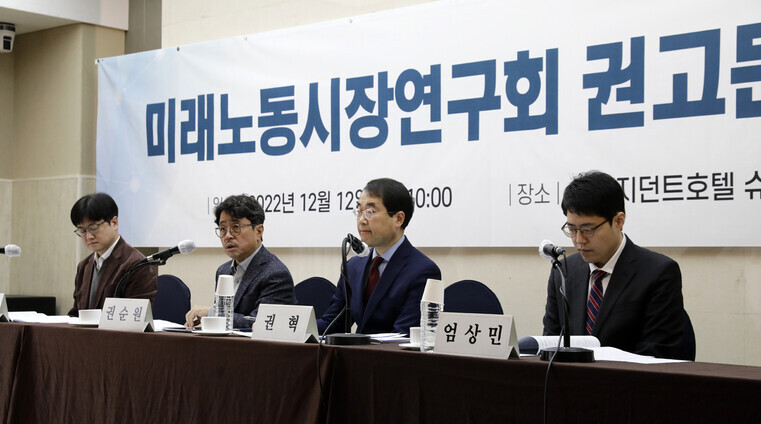hankyoreh
Links to other country sites 다른 나라 사이트 링크
Is 80.5-hour work week on horizon? Worrying preview of Yoon’s plans for labor market reforms

The Yoon Suk-yeol administration has revealed the outlines of its plans for reorganizing South Korea’s labor market.
Its approach centers on diversifying the current week-based regulatory standard for managing overtime working hours to also include monthly, quarterly, semiannual, and annual standards.
Critics argue that this approach goes against the trend of reducing working hours, as it would potentially raise the limit on working hours from its current maximum of 52 per week to as many as 80.5.
Following its examination of “directions for labor market reforms” at the request of the Ministry of Employment and Labor (MOEL), the Future Labor Market Research Association announced its recommendations to the government on Monday at the Hotel President in central Seoul’s Jung District.
To begin with, its plan would involve expanding the current weekly standard for overtime to include monthly, quarterly, semiannual, and annual units.
Under the current Labor Standards Act, working hours may not exceed 40 per week as a rule, although an additional 12 hours of overtime work per week are allowed if agreed upon between the employer and worker.
If the standard for regulatory overtime hours is expanded to monthly units, it becomes possible for employers to enlist a month’s worth of overtime hours — 52, or 12 hours multiplied by 4.345 weeks — at any given period during the month. Since the Labor Standards Act does not have any provisions barring seven-day workweeks, an employee working all seven days in a week could end up with as many as 40.5 hours of overtime work.
As measures to reduce the potential burden of long periods of continuous work, the association proposed limiting the quarterly standard to 140 hours (90% of the monthly standard), the semiannual standard to 250 hours (80% of the monthly standard), and the annual standard to 440 hours (70% of the monthly standard). It also recommended developing measures to protect health rights by guaranteeing at least 11 consecutive hours of time off before the worker’s next workday begins.
But with the Labor Standards Act mandating 30 minutes of break time every four hours for the 13 hours when an employee would be working outside of the 11 hours of time off per day, this could leave them working 80.5 hours in a given week — or 11.5 hours per day for seven days. Even with one day of rest per week, the amount could still reach 69 hours.
As other reform tasks for working hours, the association named expanding workers’ right to choose what days they work and when they arrive and leave, as well as protective measures for working during evening hours.

In terms of wage systems, it proposed abandoning the salary step system and other seniority-focused frameworks in favor of systems reflecting duties and performance.
The labor world decried the recommendations as bucking the trend of reducing working hours.
In a statement, the Federation of Korean Trade Unions called for a “full-scale reconsideration” of the recommendations.
“Instead of increasing workers’ rights to autonomous choice, these recommendations expand employers’ discretionary powers over working hours, which has serious potential to lead to systems of ‘flexible’ work for long hours while decreasing worker pay,” it said.
Lee Jeong-hee, head of the industrial relations research division at the Korea Labor Institute (KLI), said, “Beyond the aim of reflecting fluctuations in company demand and ensuring flexibility in business activities, it is impossible to see these recommendations as having any effect in terms of workers achieving work-life balance through the practical right of choice.”
The MOEL plans to move forward immediately with its plans to expand working hour unit standards and revise the wage system, with additional tasks to be based on societal discussions. While it is scheduled to announce the implementation schedule sometime early next year, most of the content related to working hours would require amending the Labor Standards Act.
The Democratic Party has commented on numerous issues with the Future Labor Market Research Association itself, noting that its membership has a pro-corporation bias and does not include workers or employers.
In a telephone interview with the Hankyoreh, Kim Young-jin, a Democratic Party lawmaker who serves as executive secretary of the National Assembly Environment and Labor Committee, said the committee would “conduct a close examination as to whether these recommendations encourage long working hours.”
By Jeon Jong-hwi, staff reporter; Jang Hyeon-eun, staff reporter
Please direct questions or comments to [english@hani.co.kr]

Editorial・opinion
![[Editorial] Does Yoon think the Korean public is wrong? [Editorial] Does Yoon think the Korean public is wrong?](https://flexible.img.hani.co.kr/flexible/normal/500/300/imgdb/original/2024/0417/8517133419684774.jpg) [Editorial] Does Yoon think the Korean public is wrong?
[Editorial] Does Yoon think the Korean public is wrong?![[Editorial] As it bolsters its alliance with US, Japan must be accountable for past [Editorial] As it bolsters its alliance with US, Japan must be accountable for past](https://flexible.img.hani.co.kr/flexible/normal/500/300/imgdb/original/2024/0417/6817133413968321.jpg) [Editorial] As it bolsters its alliance with US, Japan must be accountable for past
[Editorial] As it bolsters its alliance with US, Japan must be accountable for past- [Guest essay] Amending the Constitution is Yoon’s key to leaving office in public’s good graces
- [Editorial] 10 years on, lessons of Sewol tragedy must never be forgotten
- [Column] A death blow to Korea’s prosecutor politics
- [Correspondent’s column] The US and the end of Japanese pacifism
- [Guest essay] How Korea turned its trainee doctors into monsters
- [Guest essay] As someone who helped forge Seoul-Moscow ties, their status today troubles me
- [Editorial] Koreans sent a loud and clear message to Yoon
- [Column] In Korea’s midterm elections, it’s time for accountability
Most viewed articles
- 1[Column] The clock is ticking for Korea’s first lady
- 2Samsung barricades office as unionized workers strike for better conditions
- 3[Editorial] When the choice is kids or career, Korea will never overcome birth rate woes
- 4[Editorial] As it bolsters its alliance with US, Japan must be accountable for past
- 5S. Korea, Japan reaffirm commitment to strengthening trilateral ties with US
- 6[Guest essay] How Korea turned its trainee doctors into monsters
- 7Japan officially says compensation of Korean forced laborers isn’t its responsibility
- 8Why Israel isn’t hitting Iran with immediate retaliation
- 9Worse than worst case: Korea’s population is shrinking faster than predicted
- 10[News analysis] After elections, prosecutorial reform will likely make legislative agenda